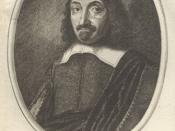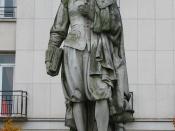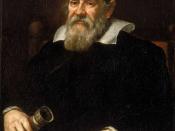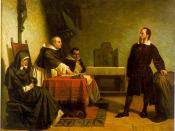We know the Baroque time is also the time for the birth of modern science. Scientist like Galileo, Descartes, Locke ÃÂ contributed astounding researching for human kind. Beside their contribution in the science, Lawrence in his book Culture and Values A Survey of the Humanities, these scientist like Descartes, Hobbes ÃÂinstead of accepting official church teachings, tried to examine the problem of human existence by their own intellectual approachesÃÂ (407). They are not only impressive scientist but also magnificent humanist.
First, we talk about Galileo and his contribution. Unlike Copernicus, killed by the Catholic church, Galileo could get away with his ÃÂcrimeÃÂ. At that time, people began to have knowledge and the concept of humanity, they had ÃÂtrust in science ad in the power of human reason, belief in a natural order, and an overriding faith in the theory of progress that the world was better than it had ever been and was bound to get better stillÃÂ (413).
People believe more in the science which mean less in the church and their doctrines. The church could not do something like ÃÂground of heresyÃÂ anymore. Due to the Galileo case, we know that the power of the church is no more. The Bible is no more the only text book for everything for we have known about the departure of many kind or art and thinking from the teaching of the church and the bile: humanism, mannerism and science which should be taken away separately from what it described in the bible. It was the time the church failed to control the most impressive thing: the power of knowledge. Galileo ÃÂse forth a new way of approaching scientific problems. Instead of trying to understand the final cause of or cosmic purpose of natural events and phenomena, he tried to explain their character and the manner in which they came aboutÃÂ (401). Galileo with his style of researching the science, with his own fighting toward the church was the proof of the evolution of humanÃÂs concept of intellectual thinking.
ÃÂCogito, ergo sumÃÂ(ÃÂthink, therefore I amÃÂ)ÃÂ (402) was the famous phrase of Descartes. We often say that ÃÂwe thinkÃÂ but unfortunately we donÃÂt think at all but follow the trend. His way of studying science also showed us the concept of the real humanist. We talk about skepticism, the ability to doubt, is what show us that we are the true human like Descartes: ÃÂthe very act of doubting proved that he was a thinking beingÃÂ (402). He want to make a fresh start by denying all of the definition he knew before. Then he began to doubt and thus thought about the problem and found the answer. This was of working was an impressive way to prove that we are the true human being for the ability of thinking at our own concept. If we donÃÂt think nor doubt, we are not human beings.
ÃÂGalileo and Descartes represent the major trends in the seventeenth-century thoughtÃÂ (403). It is true. The trend of thinking they created was the most solid proof of the definition of man. Divert from the old teaching, try to examine everything by intellectual factors, doubt everything so that we can think ÃÂ show us that we are human and a thinker.
Work citedCulture and Values A Survey of the Humanitieswww.thomson.com/learningwww.art.wasworth.com/cunninghamm06





